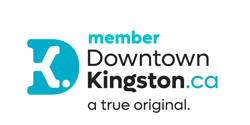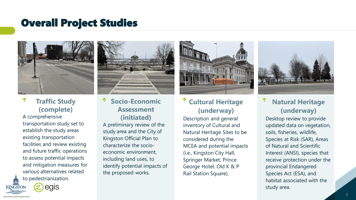Ontario’s Occupational Health and Safety Act Naloxone Kit Requirements

By June 1, 2023, employers in Ontario must provide at least one naloxone kit in each workplace in which they are aware, or ought reasonably to be aware, of the risk of one of their workers having an opioid overdose. Because of the potency of fentanyl, and the prevalence of the drug in Ontario communities, there is an increased risk of exposure and overdose.
The BIA has a supply of naloxone kits that will be provided for free to member businesses. These kits include 2 easy-to-use nasal sprays, instructions for use, links to training videos, and protective gloves. If you would like a kit, visit the downtown Kingston BIA office at 353 King St East (Suite 200), or contact member@downtownkingston.ca
-1.png?width=562&height=281&name=Newsletter%20Bulletin%20designs%20(4)-1.png)
Naloxone (pronounced na-LOX-own) is a drug that can temporarily reverse the effects of an opioid overdose. Opioids are drugs that are prescribed by a medical practitioner to treat pain. However, opioids are also used recreationally. Some commonly used opioids include:
- morphine
- heroin
- oxycodone
- fentanyl
- codeine
- hydromorphone
While opioids can be an effective part of pain management for medically supervised patients, opioid addiction and overdose are significant challenges in Ontario.
Naloxone only reverses overdoses from opioids. It will not reverse overdoses from other kinds of drugs, such as benzodiazepines or stimulants like cocaine and amphetamines.
A number of employment-related statutes saw significant modifications last year as a result of Ontario's Bill 88, the Working for Workers Act, 2022. One of those modifications was the addition of a requirement under Ontario's Occupational Health and Safety Act ("OHSA") mandating employers to offer naloxone kits when they learn that there is a possibility that a worker could overdose on opioids at work. You can find some instructions on the requirements that have been provided by the Ontario government here.
Employers should determine whether these regulations will apply to their workplace as a first step. In cases where an employer learns or should reasonably know that there may be a risk of an opioid overdose occurring in a workplace where the employee does work for the employer, the OHSA mandates that the employer furnish and keep a naloxone kit. Only if it applies, an employer must adhere to the new naloxone kit regulations.
The new guidelines established by the OHSA must be adhered to by an employer who is required to have naloxone kits available at work. However, they must:
- provide and maintain/store a naloxone kit, the contents of which are prescribed by the OHSA;
- provide at least one naloxone kit in each workplace in which they are aware, or ought reasonably to be aware, of the risk of one of their workers having an opioid overdose (note that employers may have to provide more kits at the workplace if that is a reasonable precaution in the circumstances); and
- at any time there are workers in the workplace, ensure a worker is trained to use the naloxone kit and administer naloxone (complying with the training requirements that are outlined in the OHSA) and ensure that the kit is in the vicinity of a worker trained to use the kit.
Key Takeaways
Employers in Ontario should be aware of what gives rise to these naloxone kit obligations as a result of these laws because they will impose major new obligations on them. First, employers should ascertain whether the law is applicable to their workplace. If so, the employer must make sure they abide by all OHSA rules when they take effect on June 1, 2023, in order to avoid OHSA fines. Employers that are affected by these new standards must also take into account how they will manage worker drug impairment and fulfil their obligation to provide reasonable accommodations under Ontario's Human Rights Code. Additionally, employers need to think about how naloxone kits fit into their emergency protocols.
We advise such companies to remain aware of what constitutes these obligations even if the new regulations do not now apply to the workers they employ.
Also, take notice that the Workplace Naloxone Programme in Ontario is presently offering assistance to employers who are obliged to follow new regulations by offering free naloxone training for up to two employees per workplace and/or one free nasal spray naloxone kit per workplace.
Free naloxone training and kits
Starting December 2022, Ontario’s Workplace Naloxone Program is providing support to employers who are required to comply with the naloxone requirements in the Occupational Health and Safety Act by providing free naloxone training for up to two workers per workplace and/or one free nasal spray naloxone kit per workplace.
Employers can visit the following participating program providers for more information on how to access free naloxone training and kits:
Register now for the free ON Workplace Naloxone Program.
About the Good Samaritan Drug Overdose Act
Legal protection granted by the Act
The Good Samaritan Drug Overdose Act provides some legal protection for people who experience or witness an overdose and call 911 or their local emergency number for help.
The Act can protect you from:
- Charges for possession of a controlled substance (i.e. drugs) under section 4(1) of the Controlled Drugs and Substances Act
- Breach of conditions regarding simple possession of controlled substances (i.e. drugs) in:
- pre-trial release
- probation orders
- conditional sentences
- parole
The Good Samaritan Drug Overdose Act applies to anyone seeking emergency support during an overdose, including the person experiencing an overdose. The Act protects the person who seeks help, whether they stay or leave from the overdose scene before help arrives. The Act also protects anyone else who is at the scene when help arrives.
The Act does not provide legal protection against more serious offences, such as:
-
outstanding warrants
-
production and trafficking of controlled substances
-
all other crimes not outlined within the Act
Save a life
Drug overdoses could happen with others around. Staying at the scene is important to help save the life of the person experiencing an overdose.
Witnesses should:
- call for emergency help
- be prepared by carrying naloxone to use if you suspect an opioid overdose
- provide first aid, including rescue breathing (CPR), if necessary, until emergency help arrives
- stay calm and reassure the person that helps is on the way
Tell others about the Good Samaritan Drug Overdose Act.
References:
https://www.ontario.ca/page/naloxone-workplace#free-naloxone
https://www.canada.ca/en/health-canada/services/opioids/about-good-samaritan-drug-overdose-act.html
If you have any questions or need assistance with any of the above, please contact member@downtownkingston.ca

.png?width=50&name=Sarika%20Rana%20%20(1).png)


.png?width=50&name=TEMPLATE%20NEW%20MEMBER%20(4).png)

